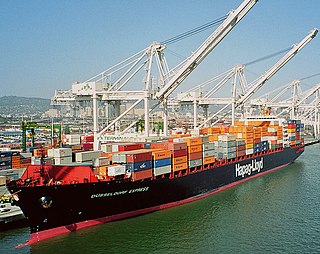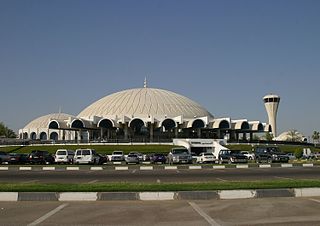This article covers the various forms of transport in the United Arab Emirates (UAE), by road, rail, air, water, etc.

A port is a maritime facility comprising one or more wharves or loading areas, where ships load and discharge cargo and passengers. Although usually situated on a sea coast or estuary, ports can also be found far inland, such as Hamburg, Manchester and Duluth; these access the sea via rivers or canals. Because of their roles as ports of entry for immigrants as well as soldiers in wartime, many port cities have experienced dramatic multi-ethnic and multicultural changes throughout their histories.

The Emirate of Sharjah is one of the emirates of the United Arab Emirates, which covers 2,590 square kilometres (1,000 sq mi) and has a population of over 1,400,000 (2015). It comprises the capital city of Sharjah, after which it is named, and other minor towns and exclaves such as Kalba', Al Dhaid, Dibba Al-Hisn and Khor Fakkan.

Hapag-Lloyd AG is a German international shipping and container transportation company, the 4th biggest in the world. It was formed in 1970 through a merger of Hamburg-American Line (HAPAG) and Norddeutscher Lloyd.

Sharjah International Airport is an international airport located 7 nautical miles east-southeast of Sharjah, United Arab Emirates. It is spread over an area of 15,200,000 m2. It has one runway, and is the only airport in Sharjah capable of international flights as of 2022.
Khor Fakkan is a city and exclave of the Emirate of Sharjah, located on the east coast of the United Arab Emirates (UAE), facing the Gulf of Oman, and geographically surrounded by the Emirate of Fujairah. The city, the second largest on the east coast after Fujairah City, is set on the bay of Khor Fakkan, which means "Creek of Two Jaws". It is the site of Khor Fakkan Container Terminal, the only natural deep-sea port in the region and one of the major container ports in the UAE. The Port of Khor Fakkan faces the Emirate of Sharjah’s eastern seaboard, extending connections with Asia and the Far East. This port is one of the Emirate’s three ports.

DP World is an Emirati multinational logistics company based in Dubai, United Arab Emirates. It specialises in cargo logistics, port terminal operations, maritime services and free trade zones. Formed in 2005 by the merger of Dubai Ports Authority and Dubai Ports International, DP World handles 70 million containers that are brought in by around 70,000 vessels annually. This equates to roughly 10% of global container traffic accounted for by their 82 marine and inland terminals present in over 40 countries. Until 2016, DP World was primarily a global port operator, and since then, it has acquired other companies up and down the value chain.

Jawaharlal Nehru Port, also known as JNPT and Nhava Sheva Port, is the second largest container port in India after Mundra Port. Operated by the Jawaharlal Nehru Port Trust Authority (JNPTA), it is located on the eastern shores of Arabian Sea in Navi Mumbai, Raigad district, Maharashtra. This port can be accessed via Thane Creek, a nodal city of Navi Mumbai. It is the main port of the Mumbai Metropolitan Region after Mumbai Port, also of Maharashtra and Western India. Its common name derives from the names of Nhava and Sheva villages that are situated here. It is also the terminal of the Western Dedicated Freight Corridor.
The Dubai Ports World controversy began in February 2006 and rose to prominence as a national security debate in the United States. At issue was the sale of port management businesses in six major U.S. seaports to a company based in the United Arab Emirates (UAE), and whether such a sale would compromise port security.
International Container Terminal Services, Inc. (ICTSI) is a global port management company headquartered in Manila, Philippines. Established on December 24, 1987, ICTSI is the Philippines' largest multinational and transnational company, having established operations in both developed and emerging market economies in Asia Pacific, the Americas, and Europe, the Middle East and Africa. The company is ranked the eighth largest container terminal operator, according to TEU equity volume.
APM Terminals is a port operating company headquartered in The Hague, Netherlands. A unit of Danish shipping company Maersk's Transport and Logistics division, it manages container terminals and provides integrated cargo and inland services. It operates 74 port and terminal facilities in 38 countries on five continents, with five new port projects in development, in addition to over 100 inland services operations providing container transportation, management, maintenance and repair in 38 countries, for an overall global presence of 58 countries. In 2018, APM Terminals was ranked the world's fifth largest container terminal operator.

Sharjah is the third-most populous city in the United Arab Emirates, after Dubai and Abu Dhabi. It is the capital of the Emirate of Sharjah and forms part of the Dubai-Sharjah-Ajman metropolitan area.
BMMI was established in 1883 and is a diversified retail and distribution, hospitality and contract services and supply group, supported by a world-class integrated logistics capability, that is based in the Kingdom of Bahrain, with international operations. BMMI is a provider of facility management, logistics and procurement services to governments and to non-governmental, commercial and military organisations. The group specialises in the wholesale, distribution and retail of food and beverages.
The Port of Salalah is the largest port in Oman and has been in operation since 1998. Situated in the Dhofar Governorate, on the Arabian Sea which is on the northern part of the Indian Ocean, it is centrally located at the crossroads of trade between Asia and Europe. With over 2.5 billion consumers, it serves the markets of East Africa, the Red Sea, the Indian Subcontinent and the Arabian/Persian Gulf on its doorstep.

Crescent Enterprises is a multinational company headquartered in the Emirate of Sharjah, United Arab Emirates. The company operates through four platforms: CE-Operates, CE-Invests, CE-Ventures, and CE-Creates, across sectors that include ports and logistics, food and beverages, and business aviation, as well as across business verticals, such as private equity, venture capital, and business incubation.

H.E Dr. Rashid Al Leem is the former chairman of Sharjah Electricity and Water Authority (SEWA). The ruler of Sharjah, His Highness Dr. Sheikh Sultan bin Mohammed Al Qassimi chose him at the young age to the project of building and economic zone in the emirate. He has also written several books. The Vice-President and Prime Minister of the UAE and Ruler of Dubai Sheikh Mohammed Bin Rashid Al Maktoum, honoured him the title Ambassador of Knowledge of the UAE.

Sharjah Electricity, Water and Gas Authority (SEWA) is a government utility in the Emirate of Sharjah that provides electricity, water and natural gas to approximately 300,000 consumers. SEWA also owns a bottled drinking water subsidiary named Zulal.

SNOC is an Oil and Gas producer based in Sharjah, UAE. Established by Emiri decree in 2010, SNOC is a corporation wholly owned by the government of the Emirate of Sharjah. SNOC is the operator of the Sajaa Assets located in Sharjah, UAE. The Sajaa Assets consist of four gas fields, a hydrocarbon processing complex, and two marine terminals.

Global Ports stands as the foremost operator of container terminals in the Russian market boasting impressive throughput capacity and container turnover. Global Ports’ terminals are located in the Baltic and Far Eastern basins. These areas serve as pivotal hubs for foreign trade cargo flows within the Russian Federation.














